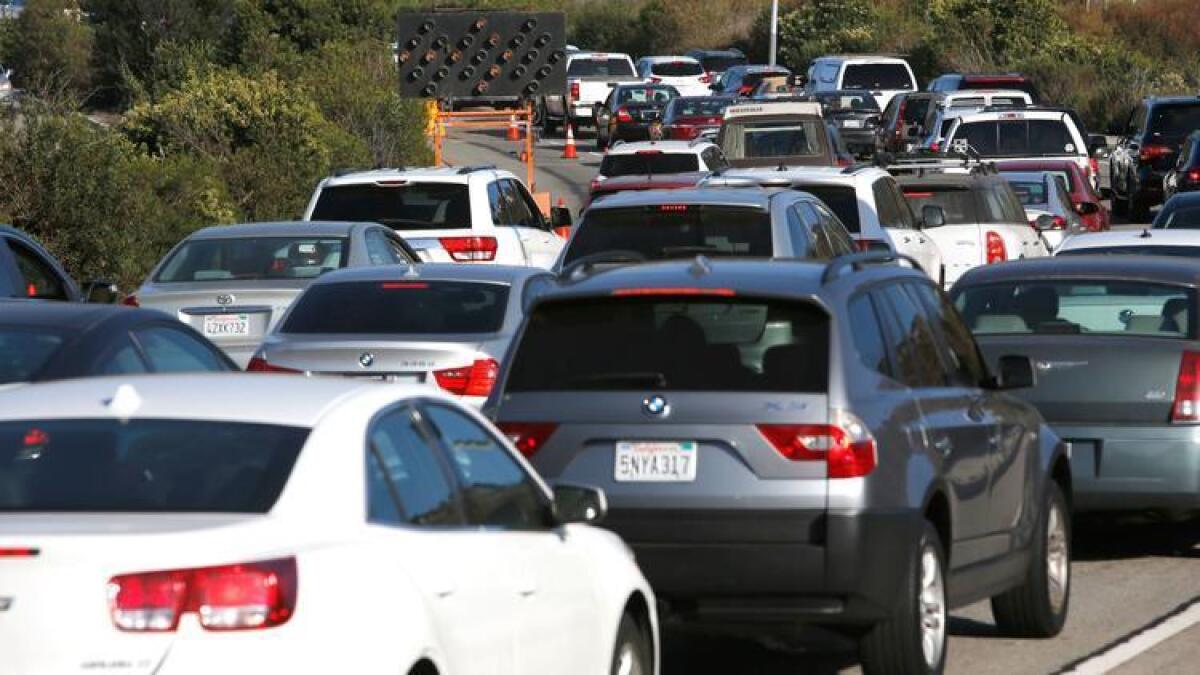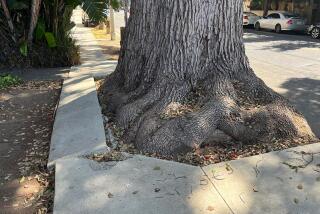L.A. reverses course on lane reductions that ‘most people outright hated’

The city of L.A. recently reduced traffic lanes on Vista del Mar near Dockweiler State Beach. (July 28, 2017)
Los Angeles officials said they had to act quickly to address the brewing legal concerns with Vista del Mar, a favored commuting route near Dockweiler State Beach.
City Hall had recently paid $9.5 million to settle a lawsuit filed by the family of a teenage girl who was killed by a driver there, and another lawsuit loomed. Transportation officials scrambled to eliminate a traffic lane in each direction and reduce the city’s liability before summer beach crowds began to arrive.
The resulting “road diet” on Vista del Mar — combined with lane reductions on other streets in the area — sparked a wave of opposition that engulfed the Westside and the South Bay. City Hall was flooded with calls. A condo association sued. And frustrated commuters began raising money to recall Westside Councilman Mike Bonin.
After weeks of backlash, Bonin backpedaled late Wednesday night, acknowledging in a YouTube video that “most people outright hated” the Vista del Mar changes. He apologized to drivers and said lanes would be restored next month.
“If you are one of the many people who were inconvenienced, who were late to work, or who missed a bedtime story with your toddler, I am truly sorry,” Bonin said. “We are working to make this right.”
In an agreement with Los Angeles County Supervisor Janice Hahn, the city will remove Vista del Mar’s street parking and reduce parking fees at a nearby Dockweiler Beach lot. City officials said the changes were a win-win, making room for four traffic lanes while preserving residents’ access to the coast. Nevertheless, it delivered a painful learning experience for city officials who have a sweeping plan for improving street safety by reducing vehicle lanes on key corridors.
The project emerged as a flashpoint in L.A.’s ambitious plans to eliminate traffic fatalities and shift drivers to other transportation options by adding hundreds of miles of bicycle and bus-only lanes.
Those plans, called Vision Zero and Mobility Plan 2035, both hinge on the elimination of vehicle lanes in an effort to reduce speeds. Some projects have already sparked similar debates as advocates, elected officials and drivers work to divide a limited amount of space on the city’s street network.

On Wednesday, Councilman Gil Cedillo — who has long been at odds with cycling advocates — moved to crack down on “road diets” in his district, which stretches from Westlake to Highland Park. Cedillo drafted a motion calling for the Transportation Department to halt any effort to remove traffic lanes, or even reconfigure them, until he approved the changes.
In May, Cedillo easily beat back an election challenge from a candidate who criticized him for failing to put in place bicycle lanes on Figueroa Street in Highland Park and Cypress Park. Cedillo said his proposal, which heads to the council’s transportation committee, “speaks for itself.”
“For the most part, these road diets appear to be disastrous with respect to what the public thinks of them,” he said.
Cedillo’s proposal throws into question a Vision Zero project proposed for a two-mile stretch of Temple Street, just west of downtown, which runs through the Echo Park section of his district. Two weeks ago, the city’s Vision Zero team held a community workshop on plans for restriping Temple, taking it from two car lanes in each direction to one.
The city’s workshop for the Temple proposal was “poorly attended,” said Freddy Ceja, a spokesman for Cedillo. He said his boss does not support the project.
Bruce Gillman, a Department of Transportation spokesman, said his agency is working with council offices to conduct outreach on the Temple project. He said his agency cannot comment on council proposals that “haven’t been voted on yet.”
The Vista del Mar redesign should calm some of the vitriol that arose over the last two months and help Los Angeles officials “hit the reset button,” Transportation Department general manager Seleta Reynolds said.
In recent weeks, residents from Playa del Rey and neighboring Manhattan Beach had spoken out against the Vista del Mar lane reduction and formed a grass-roots advocacy group to fight future road diets in Los Angeles and other cities.
The group has received calls from neighborhoods in L.A., including Studio City and Woodland Hills, as well as Long Beach, said Kara Mendelson, a Manhattan Beach resident who heads the group Keep L.A. Moving.
“We’re showing people that you don’t have to roll over and let things happen to you,” Mendelson said. “As these road diets roll out, more and more people are going to find that their quality of life is brought to a barely habitable level.”
The anger over Vista del Mar and other proposed street restriping projects has sparked some alarm among street safety advocates, who say Los Angeles officials have to improve their communication with drivers about why the projects are important.
“I want our elected officials to stand their ground as long and as hard as they can,” said Deborah Murphy, executive director of Los Angeles Walks, a pedestrian advocacy organization. “We want them to stand by the things that we’ve promised to Angelenos — that we’re going to create safe streets and that we’re going to reduce traffic fatalities to get us there.”
Murphy said drivers in Los Angeles “have gotten too entitled, thinking that a trip should only take a certain amount of time. Who said that? Where is it in the Angeleno owner manual that it will only take 20 minutes to get somewhere?”
In addition to the court of public opinion, the Vista del Mar project will have its day in court.
A condo association in Playa del Rey sued the city earlier this month, and the Keep L.A. Moving advocates are “dotting the I’s and crossing the Ts” on a lawsuit that will accuse L.A. of bypassing state environmental laws, Mendelson said.
“These projects being litigated is not a new thing, and it’s not even a uniquely Los Angeles thing,” said Reynolds of the Transportation Department. “What it requires is that you hold yourself to a really high standard. You have to do good work.”
Twitter: @laura_nelson
Twitter: @davidzahniser
Twitter: @AleneTchek
ALSO
Man sentenced to 115 years for fondling women while impersonating a police officer
Two San Diego County shopping malls swarmed by thousands of street racers performing stunts
UPDATES:
3:20 p.m.: This article was updated with reaction and additional details.
This article was originally published at 10:25 p.m. on July 26.
More to Read
Sign up for Essential California
The most important California stories and recommendations in your inbox every morning.
You may occasionally receive promotional content from the Los Angeles Times.













